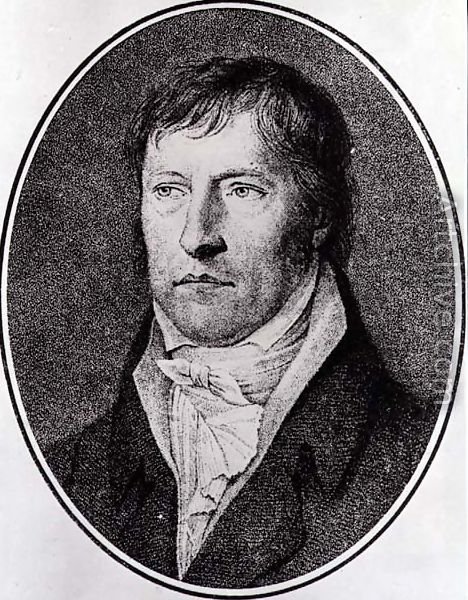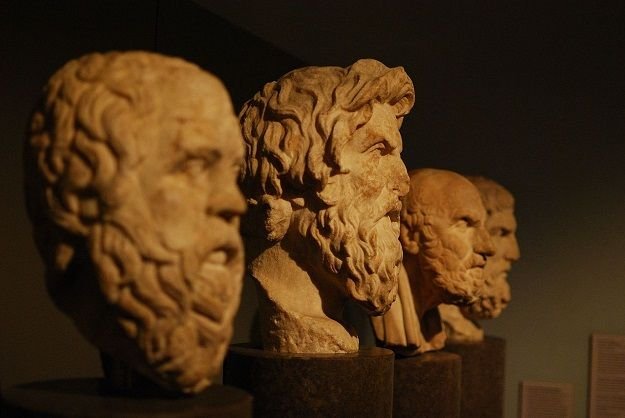The dialectic has formed over a long historical period, beginning with the thinkers of ancient India, China and Greece, which set the ideological foundations of dialectics. Three historical forms can be justified of the dialectic of antiquity: Hegel's dialectic and the Marxian dialectic. The poem of thought of ancient philosophy has embraced a great variety of questions about the universal variability of everything that exists. They understood it as turning the origin of the world into a variety of different phenomena, as well as turning the different forms of being into one another. Many ancient Greek philosophers were dialectics. Socrates initially introduces into the culture and philosophical meditations the term dialectic, which makes sense and meaning for discovery in the dispute. He possessed this art of perfection.

Portrait of Georg Hegel
Another philosopher who has contributed to the development of ancient dialectics is Heraclitus. He is known for his Pantaire-endorsements - everything is changing. You can not go twice in the same water and more. With the thought is the same. Hegel's dialectics proceeds from objective-idealistic ideas, and therefore his dialectics is called idealistic dialectics.
Karl Marx, having in mind the achievements of Hegel, applies the laws of developing the absolute spirit in the development of matter as the foundation of society and the world, so his dialectics is called materialistic. Materialistic dialectics has two levels of explanation:
- Ideological level
- Theoretical level
The first level is formed by the principles defining the dialectical-materialistic way of understanding the world.
The second level is constituted by the laws of materialistic dialectics.
These are the laws of unity and the struggle of opposites that reveal the source of development. This is the quantity-quality transition law, the change that shows how development evolves.
The Law of Denying the Denial of the Base, which gives the opportunity to explain the direction of development. The principles of dialectics are mostly common ideas that express the conceptual foundations of dialectics.
There are the following principles of dialectics:
1). The principle of development - this is the initial dialectical idea that begins the development of dialectics.
2). The principle of universal interconnection takes place in the materialist dialectic because it provides an explanation for the inner source of development and the external universal scope of material and spiritual life. According to this principle everything in the world is interconnected, but the relationship between the phenomena is different.
This process is related to the idea of reflection and interaction as a dialectical contradiction.
The Principle of Determinism
It gives an opportunity to specify the overall picture of the development of the world. According to him, all the phenomena in the world are causal - every phenomenon is a consequence of any reason. He says that nothing can arise from anything or become nothing!

The modern concept related to the development of dialectics is called synergy. This term was first proposed by the German physicist Hacken in 1973 to form the general theory of self-organization and system development, i. in synergy, the principles of movement and systemicity of matter that have received the justifications in dialectics are realized.
The phenomenon of self-organization is explained by the complex interaction of many phenomena. A central place where he finds advanced in complex systems, preserving their equilibrium and sustainability. Synergy is associated with the notion of synergy, which shows the complexity of the interaction of different systems. The law of unity and the fight of opposites reveals the source and the driving force of any development, which is the contradiction. It is related to 3 stages of development, namely the emergence of one's own. The contradiction is mutual to the opposite, and they are different inter-objects, increased others. marginal dimensions that form in a particular substrate. element, part, part of the whole or the system of a thing.
Unity and struggle are two sides to the interaction of opposites.
Three states are characteristic of the controversy:
- Reharmony
- Disharmony
- Conflict
Harmony is a state in which a sequence of interaction of opposites is established, based on the essential connection between them. Disharmony reflects the presence of certain distortions in the development of the contradiction that they cause to a breach in the functioning of the system. Conflict is a state of development of contradiction when the conflict of opposites reaches a limit, after which destruction of essential relations becomes. The law on the reciprocal transition of quantitative and qualitative changes. According to this law, the development takes place on the path of the quantitative changes that go beyond the measure of the object and cause qualitative changes. The content of this law is revealed using the categories: quality, quantity, property, measure, jump, etc. Quality is the intrinsic certainty of the subject, which expresses its specificity. Property is the category that expresses individual aspects of the subject in the external environment. The quantity is a certain degree of development of the property of the object, related to the characteristic of its qualities. The quality and quantity in the process of development are transformed as qualitative and quantitative changes, conditioned by the nature of connections and interactions, the unity and diversity of everything that exists. In order to understand this law, it is necessary to develop skills for assessing the quality of the observed and managed systems, for the unity or the measure of the changes that take place in them. The Negative Denial Law explains the direction of evolution as a sequence of changing denials. Negative - the transition of an object into a new quality, conditioned by the development of its own internal and external relations and relations. Besides the principles, the laws of dialectics, there are categories of dialectics. Categories in dialect. They are extremely broad concepts, in the content of which appear the universal aspects of the existence and development of the objective world, the initial forms of thinking and development.
There are the following categories of dialectics.
- nature and phenomenon
- content and form
- whole, part
- necessity and coincidence
- reality and opportunity
The meaning of dialect. It opens up in every original idea that reveals its purpose.
The mechanism for explaining the changing nature of things, despite its complex, mysterious and multifaceted nature, has its enduring faces, impermanent principles, permanent relationships and relationships, eternal law processes that are the basis for revealing and exploring the essence of man, nature, the world. In this sense, the dialectic is as ancient as new and unknown, related to the future of man and people.
a very interesting story and very remarkable Thank you friends for posting to us all.
You are welcome :)
This is an interesting write-up. It's so educative. 👍
Thank you :)
Focusing on Hegel's and Engel's ultimate agenda, and avoiding getting caught up in their impenetrable theories of social evolution, gives us the opportunity to think and act our way toward freedom, justice, and genuine liberty for all. Thanks for sharing such an amzing article!
You get my follow and Resteem!
Thank you very much. Cheers!
Right now I see two major forces in conflict and I'm having difficulty finding anyone to discuss this with.
The multicultural states of the US and the EU vs. the totalitarian unicultural states of Russia, Turkey, Israel and China are increasinly in conflict.
The EU accepts refugees, but Israel does not. In the EU there are forces that want no refugees and then there is the Brussel's doctrine that for some reason they are needed, or in order to be good and virtuous, we must accept them. Meanwhile the United States and the EU are both paralyzed by how to maintain borders and create fair laws for newcomers.
The inscribed words in the statue of liberty are now made into somewhat of a joke, and should instead read 'We will take your intelligent, your educated, your beautiful, your rich and everyone else can rot or get shot.'
Russia, Israel and China should have a statue that reads, 'come to us as tourists and then get out because you will never ever be integrated in our society.'
What is the synthesis other than nuclear war and the end of the species?
Determinism is what made me compassionate towards everyone, I wish everyone believe in determinism, the world would be a much better place. Thanks @godflesh for the awesome write up!
This post has received gratitude of 10.92% from @appreciator courtesy of @godflesh!
Good post. Keep posting